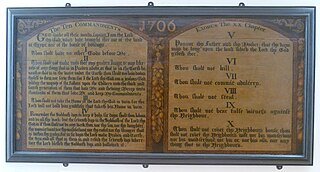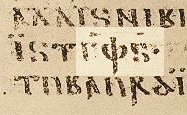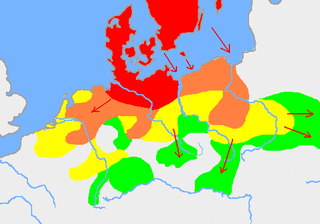
The Germanic languages are a branch of the Indo-European language family spoken natively by a population of about 515 million people mainly in Europe, North America, Oceania and Southern Africa. The most widely spoken Germanic language, English, is also the world's most widely spoken language with an estimated 2 billion speakers. All Germanic languages are derived from Proto-Germanic, spoken in Iron Age Scandinavia.
The Germanic umlaut is a type of linguistic umlaut in which a back vowel changes to the associated front vowel (fronting) or a front vowel becomes closer to (raising) when the following syllable contains, , or.

A synonym is a word, morpheme, or phrase that means exactly or nearly the same as another word, morpheme, or phrase in a given language. For example, in the English language, the words begin, start, commence, and initiate are all synonyms of one another: they are synonymous. The standard test for synonymy is substitution: one form can be replaced by another in a sentence without changing its meaning. Words are considered synonymous in only one particular sense: for example, long and extended in the context long time or extended time are synonymous, but long cannot be used in the phrase extended family. Synonyms with exactly the same meaning share a seme or denotational sememe, whereas those with inexactly similar meanings share a broader denotational or connotational sememe and thus overlap within a semantic field. The former are sometimes called cognitive synonyms and the latter, near-synonyms, plesionyms or poecilonyms.
In linguistics, the Indo-European ablaut is a system of apophony in the Proto-Indo-European language (PIE).
In the Germanic languages, weak verbs are by far the largest group of verbs, and are therefore often regarded as the norm. They are distinguished from the Germanic strong verbs by the fact that their past tense form is marked by an inflection containing a, , or /ð/ sound rather than by changing the verb's root vowel.

Proto-Germanic is the reconstructed proto-language of the Germanic branch of the Indo-European languages.

Kirk is a Scottish and former Northern English word meaning "church". It is often used specifically of the Church of Scotland. Many place names and personal names are also derived from it.
Although English is a Germanic language, it has Latin influences. Its grammar and core vocabulary are inherited from Proto-Germanic, but a significant portion of the English vocabulary comes from Romance and Latinate sources. A portion of these borrowings come directly from Latin, or through one of the Romance languages, particularly Anglo-Norman and French, but some also from Italian, Portuguese, and Spanish; or from other languages into Latin and then into English. The influence of Latin in English, therefore, is primarily lexical in nature, being confined mainly to words derived from Latin and Greek roots.

In modern English, the nouns vates and ovate (, ), are used as technical terms for ancient Celtic bards, prophets and philosophers. The terms correspond to a Proto-Celtic word which can be reconstructed as *wātis. They are sometimes also used as English equivalents to later Celtic terms such as Irish fáith "prophet, seer".
In English, the digraph ⟨th⟩ represents in most cases one of two different phonemes: the voiced dental fricative and the voiceless dental fricative (thing). More rarely, it can stand for or the cluster (eighth). In compound words, ⟨th⟩ may be a consonant sequence rather than a digraph, as in the of lighthouse.
In historical linguistics, the German term grammatischer Wechsel refers to the effects of Verner's law when they are viewed synchronically within the paradigm of a Germanic verb.

Spanish is a Romance language which developed from Vulgar Latin in central areas of the Iberian peninsula and has absorbed many loanwords from other Romance languages like French, Occitan, Catalan, Portuguese, and Italian. Spanish also has lexical influences from Arabic and from Paleohispanic languages such as Iberian, Celtiberian and Basque.
In English orthography, the letter ⟨k⟩ normally reflects the pronunciation of [] and the letter ⟨g⟩ normally is pronounced or "hard" ⟨g⟩, as in goose, gargoyle and game; or "soft" ⟨g⟩, generally before ⟨i⟩ or ⟨e⟩, as in giant, ginger and geology; or in some words of French origin, such as rouge, beige and genre. However, silent ⟨k⟩ and ⟨g⟩ occur because of apheresis, the dropping of the initial sound of a word. These sounds used to be pronounced in Old and Middle English.

The English word god comes from the Old English god, which itself is derived from the Proto-Germanic *ǥuđán. Its cognates in other Germanic languages include guþ, gudis, guð, god, and got.
Many words that existed in Old English did not survive into Modern English. There are also many words in Modern English that bear little or no resemblance in meaning to their Old English etymons. Some linguists estimate that as much as 80 percent of the lexicon of Old English was lost by the end of the Middle English period, including many compound words, e.g. bōchūs, yet the components 'book' and 'house' were kept. Certain categories of words seem to have been more susceptible. Nearly all words relating to sexual intercourse and sexual organs as well as "impolite" words for bodily functions were ignored in favor of words borrowed from Latin or Ancient Greek. The Old English synonyms are now mostly either extinct or considered crude or vulgar, such as arse/ass.

The word witch derives from the Old English nouns wiċċa[ˈwit.t͡ʃɑ] and wiċċe[ˈwit.t͡ʃe]. The word's further origins in Proto-Germanic and Proto-Indo-European are unclear.
Gothic is an inflected language, and as such its nouns, pronouns, and adjectives must be declined in order to serve a grammatical function. A set of declined forms of the same word pattern is called a declension. There are five grammatical cases in Gothic with a few traces of an old sixth instrumental case.

Gothic is an extinct East Germanic language that was spoken by the Goths. It is known primarily from the Codex Argenteus, a 6th-century copy of a 4th-century Bible translation, and is the only East Germanic language with a sizeable text corpus. All others, including Burgundian and Vandalic, are known, if at all, only from proper names that survived in historical accounts, and from loanwords in other languages such as Portuguese, Spanish, Catalan, Occitan and French.
Old High German is an inflected language, and as such its nouns, pronouns, and adjectives must be declined in order to serve a grammatical function. A set of declined forms of the same word pattern is called a declension. There are five grammatical cases in Old High German.
Historical linguistics has made tentative postulations about and multiple varyingly different reconstructions of Proto-Germanic grammar, as inherited from Proto-Indo-European grammar. All reconstructed forms are marked with an asterisk (*).








